The Winter 2025 Anime Preview Guide
OKITSURA: Fell in Love with an Okinawan Girl, but I Just Wish I Know What She's Saying
How would you rate episode 1 of
Okitsura ?
Community score: 3.5
What is this?
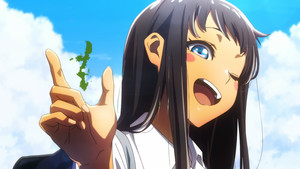
Teruaki Nakamura recently transferred to a school in Okinawa from Tokyo and fell in love with a girl. Unfortunately, he can't understand her dialect. With the help of his new friend Higa-san, Nakamura will experience a cross-cultural romance on the southern island.
OKITSURA: Fell in Love with an Okinawan Girl, but I Just Wish I Know What She's Saying is based on the Okinawa de Suki ni Natta Ko ga Hōgen Sugite Tsurasugiru manga series by Egumi Sora. The anime series is streaming on Crunchyroll on Saturdays.
How was the first episode?
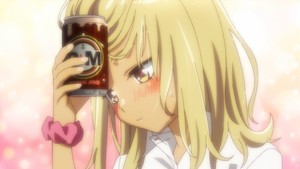
Rating:
This show reminds me a lot of last year's Hokkaido Gals Are Super Adorable. In that anime, a normal guy moves from Tokyo to Japan's northern main island, Hokkaido. He then makes friends with some of the girls there and through them experiences a clash in both culture and local language. Okitsura is basically the same exact setup—only instead of moving north, he moves south to Okinawa.
Through a series of vignettes centered around Teruaki's daily life, the anime provides a series of educational (and humorous) lessons about the Uchinaaguchi language and its cultural impact in modern Okinawan society. These are generally fun and interesting, especially to anyone interested in life on the little island.
These are all tied together through Teruaki's crush on Kyan, a local girl who speaks almost entirely in Uchinaaguchi. Of course, being that Teruaki can't understand her, we also get the character of Kana, a friend of Kyan's who speaks both languages. This forms our love triangle for the show, as while Teruaki's situation is pretty clearly laid out in the show's title, Kana has a huge crush on him as well. And as for Kyan's thoughts on the whole situation? She seems to be totally unaware of all the romantic feelings swirling around her.
It's a good enough little romance set up, though a somewhat tragic one. Teruaki is so hyper-focused on Kyan that I can't imagine Kana ending up as anything but a heartbroken mess when all is said and done—even should Kyan end up turning Teruaki down. And as she is the one doing all the hard work of translating, basically facilitating the relationship between the other two, it doesn't exactly feel good having the sense her efforts likely won't be rewarded.
All in all, I think this one lives or dies based on how interesting you find the lessons about Okinawa and how into the love triangle you are. For me, I'm not terribly interested in either one, making this show one that feels perfectly serviceable but one I'll be unlikely to watch week to week.
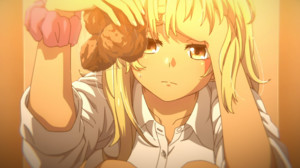
Rating:
Finally, a use for my BA with a double-major in linguistics and Japanese! I knew this day would come eventually!
OKITSURA is the kind of comedy with a very basic premise that most of the comedy stems from: Teruki is a Tokyoite who has moved not just to Okinawa, but a small town. He has a crush on a girl in his class named Kyan, but she speaks Uchinaaguchi, the endangered regional language, and he can't understand what she's saying. Teru is kind of a nonentity, but that's okay because the main character is really Okinawan language and culture. Rather than focusing on the island's greatest hits, like shiisaa or sanshin music, there's care put into small aspects of the culture and daily life. A bit about sata andagi isn't so much about the food itself, but how overwhelming it can be when a bunch of people from a hospitable culture want to share their locale's variation on sweet fried dough (one of the near-universal foods, along with “stuff wrapped in dough”). The resulting mood is warmer and more intimate, with a deep-seated love for Okinawa and its people. I was actually shocked that Egumi Sora isn't Okinawan himself, though he does live there now. The humor is more gentle than laugh-out-loud funny, stemming from Teru navigating the differences between the provincial nature of small-town Okinawa and the big city he's used to.
At the ANN Trailer Watch Party, a chat member asked if the language difference was similar to taking someone from Washington State and moving them to Florida. If you're reading this, I'm sorry for calling you out, but you're a useful example of what some people's starting position is. The answer to that is no, it's more comparable to American English and, say, Scots, or even Frisian. What Kyan speaks, Okinawan, or Uchinaaguchi, is considered a separate language from Japanese by most linguists worldwide, though most characters speak a hybrid dialect. Like many colonized languages, it's highly endangered due to the Japanese conquerors of Okinawa systematically building a stigma around it and stamping it out. To kill a language is to dilute its culture, as the two are inextricably linked; in celebrating both, OKITSURA understands and illustrates that.
Do I feel like my degree helped me appreciate OKITSURA? Heck yeah! It was a lot of fun comparing Kyan's vocabulary to the Japanese I know. But I also don't think it was necessary. All you need is curiosity and an interest in learning about languages and cultures.
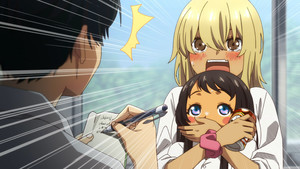
Rating:
This is a thing I am thinking – it would be better to watch this show if you speak Japanese more fluently, nu? For why? It is a show that is wanting to make you understand how it is that the people of Okinawa speak, and it is not so different from how you and I are speaking. But the words, they say them in a way that we do not. They are saying them in a way that makes them sound like not-words, and bubelah, this is making the story a thing it is not so easy to understand. But, oy gevalt, these ketzeleh, they are so cute, I am not minding that so much.
Could this be because my bubbe and mumes talked in Yiddish dialect? Eh, this could be true. We are all using this way of talking in my family still, translating the Yiddish into the English when we are all falling on our noses from wanting to sleep or shutting the lights when we are leaving the room. But if you are speaking any dialect of any language, I am thinking you will be finding something to be relating to. This is because the language, it doesn't matter so much. What matters, it is the way that we are all talking differently, and sometimes, that is making it very difficult to be understanding each other, nu?
Am I liking the choices the translators are making? Eh, not so much. But I'm thinking it isn't so easy to translate such a show as this. It is needing to be telling us what the words are meaning in Japanese and in English, and because many of us are not understanding Japanese so good, it is taking away from some of the funniness. Too much text is being on the screen, and there is no good way to go around that. So some of the time there is too much translating, and some of the time there is not enough translating. But it is being what it is – a try to find the best way to be letting us know what is being said and what it is like being Teruaki. And maybe it is not so bad, because it is giving us maybe a feeling of being like him, too, with the not knowing everything that is being said. I am telling you, bubelah, this is not putting the translators in the easy place.
I am thinking still that you will be getting more from this story if you are understanding Japanese. But this is being fine, and it is something I will maybe watch more of.
(With apologies to my grandparents. I know you didn't come from the old country for me to write like this.)
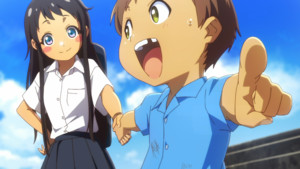
Rating:
Okitsura is one of those shows that can be very difficult to judge as someone who barely has a kindergartener's understanding of regular Japanese, much less any of its more obscure regional variations. On top of that, I'm under the impression that the Uchinaaguchi spoken by our main character's titular love interest is closer to being its own distinct language. This makes it hard to know how much of the loss in translation is meant to be utterly indecipherable for the whole audience instead of just our boy Teruaki. The presence of Japanese subtitles in this premiere seems to indicate that most viewers probably aren't expected to comprehend Kyan that much when she's in full-on Okinawan mode, but it might have made for funnier comedy if the subtitles were localized in such a way to make it clearer when she's simply speaking Japanese with a really thick accent. Then again, with Kana serving as Kyan's interpreter, along with all of the bubble text on screen that is already drawing so much attention to the miscommunications and mispronunciations, it might simply have been impossible to translate Okitsura in a manner that preserved the native language experience for all of us across the sea.
To be clear, I'm not starting with such a heady analysis of the linguistic complications that come part-and-parcel with translating such a seemingly simple comedy as Okitsura to criticize the show. I actually really liked this cute little cartoon, and I do not begrudge the localizers, which must have been a tough job, either. I think this sort of stuff is fascinating, both as a fan of anime and of Japanese culture at large. As for Okitsura's content, while I wouldn't say it isn't interesting in its own right, it also isn't trying to be anything especially complex. As the title says, the whole appeal of this premise is watching a goofy kid navigate his adorable adolescent crush on a girl that he can only ever partially understand. Thankfully, the show is smartly directed and well-paced, so its comedy beats still land for an English-speaking viewer like me mostly, and the show is never dull in the meantime.
Okitsura functions just as much as an advertisement for the island of Okinawa itself as it does a cute anime rom-com, and that is another facet of the show that makes it appealing to folks who might not be able to completely grok the linguistic humor. The show's lush colors and vivid lighting really sell the natural beauty of the island, and while Teruaki is our de facto perspective character, the premiere thankfully never regresses into turning Okinawa or its denizens into postcard caricatures of themselves. Kyan is a genuinely charming and sweet young lady, so much so that it makes sense why Teruaki would be so smitten with her despite the language barriers. Her effortless aura of carefree joy is infectious without being infantilizing, which makes it easier to get invested in the “romance” angle of this romantic comedy, and hopefully, it won't simply devolve into “Happy Go Lucky Brown Girl Shows the Uptight City Boy How To Hang Loose and Love Life” pablum. I really enjoyed my time with Okitsura, and I'll be looking forward to checking back in with these cute kids in the coming weeks this winter.
discuss this in the forum (290 posts) |
this article has been modified since it was originally posted; see change history
back to The Winter 2025 Anime Preview Guide
Season Preview Guide homepage / archives